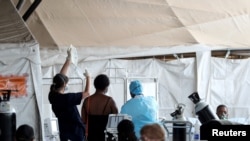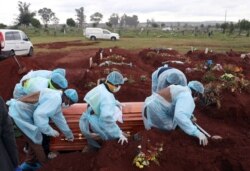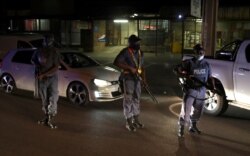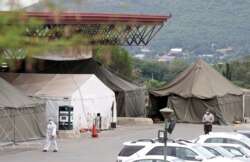South Africa's president has extended restrictions as coronavirus infections affect more and more people — including, notably, the U.S. ambassador to South Africa, who announced this week she was recovering from the virus.
President Cyril Ramaphosa said the continued restrictions — which include an extension of the nation’s curfew, alcohol ban and limits on gatherings, plus the closure of South Africa’s land borders — are necessary. He also vowed that his government will do everything it could to get enough vaccines.
“The pandemic in our country is now at its most devastating,” he said in a televised address on Monday night. “The number of new infections, hospital admissions and deaths is higher now than it has ever been since the first case was recorded in our country in March 2020. Since New Year’s Day, we have recorded nearly 190,000 new coronavirus infections. The country has recorded more than 4,600 COVID-19 deaths so far this year.”
South Africa has seen 1.2 million confirmed cases since the virus arrived in March. The second wave of the virus — featuring a new variant that appears to be more contagious — began in December.
Recent new cases include the U.S. ambassador to South Africa, who late Monday announced that she spent 10 days in intensive care after having contracted the virus in late December. In a written statement, Ambassador Lana Marks said her condition is improving and that doctors are confident she will eventually make a full recovery.
Ramaphosa announced a two-phase plan to keep South Africans safe.
“Firstly, we must do everything possible to slow the rate of transmission and, as we have done before, to flatten the curve of infection,” he said. “Secondly, we will undertake to defeat this virus a massive program of vaccination so that we can achieve immunity across our population and thereby slow the spread of the virus.”
Last week, the health minister announced that South Africa will receive 1 million Indian-manufactured vaccine doses by the end of January, and another half-million in February. The nation hopes to vaccinate 40 million people — about 67 percent of the population — by year’s end.
The entire African continent, Ramaphosa added, will need about 1.5 billion doses of the vaccine to achieve herd immunity.
But, Ramaphosa stressed, prevention is key. He urged South Africans to avoid unnecessary contact with others, to stay home if possible and to continue with hygiene precautions.
“We are now in the center of that storm,” he said. “We do not know how much longer it will last or how much worse it will get. But we know what we need to do to weather the storm, and to survive. We know what we need to do to protect ourselves and to protect those around us. We know also what we need to do — as a nation, as well as as a continent and as a global community — to overcome this pandemic. We need to therefore act with a common purpose, understanding that what we each do is important for ourselves, for our families, our communities and our society.”
The alternative, Ambassador Marks said in her statement, is dire.
“This is a tremendously serious and unpredictable illness,” wrote the 67-year-old diplomat and mother of two, “and it has been the most physically debilitating thing that I have ever experienced in my entire life.”







